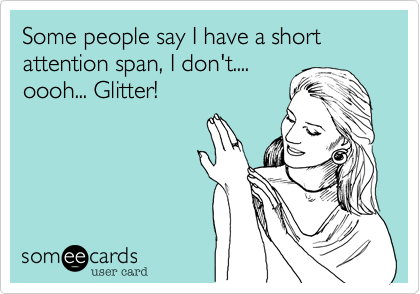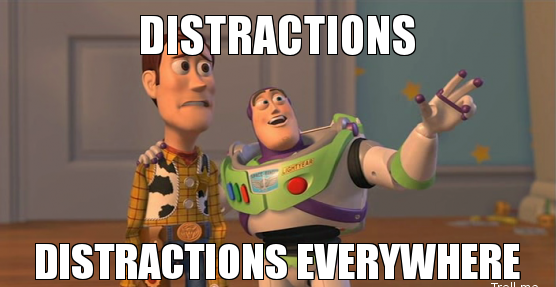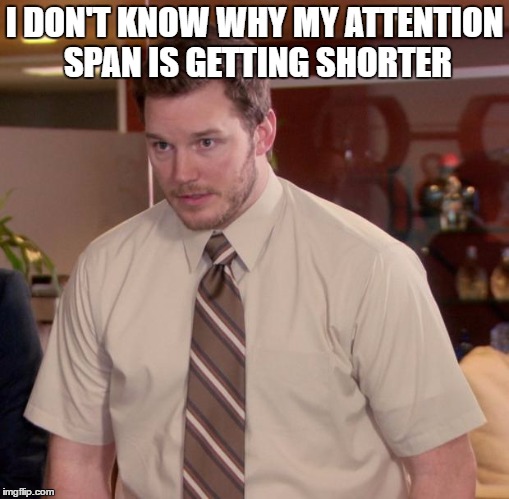Evidently, people nowadays seem to possess a shorter attention span than a goldfish, lasting only 9 seconds, read more here: https://standard.asl.org/27705/uncategorized/social-media-causes-attention-spans-to-drop/ and nobody saw this coming, quickly catalysed by the COVID lockdowns, looks like the issues are multifold at this point.
And here’s the kicker - this isn’t just some random fun fact. Since COVID lockdowns hit, our attention spans have taken an absolute nosedive, and nobody really saw it coming. I’ve been watching this play out like a slow-motion train wreck, both in my own behavior (yeah, I’m guilty too) and in everyone around me - from colleagues who can’t sit through a meeting without checking their phones, to random strangers who bump into each other because they’re glued to their screens to drivers forgetting their lane & wandering off!
Pre-COVID Situation
Even before COVID, people’s attention span was going down, this is(was) fully blamed on the influence of social media and short form videos. What I’ve came to realise is that its not just becuase of social media or short form videos, but a whole lot of things, mainly how information is presented to us - Minimalistic UI/UX everywhere, capsule sized news articles, SMS(even even shorter abbreviations in real world usage even when people talk(read Gen-Z)) and then of course, social media and short form videos.

Every company and brand is now running behind minimalism to a point of extreme, though it is a nice concept & saves a lot of time(most of the time), side effects are multi fold.
Because of the influence it has on you from every day objects like mobile phones and apps, you start expecting mininalism in things where you’re not supposed to look for minimalism, from microwave ovens to washing machines, you might often think why is this complex to a point where the same thought creeps into every single aspect of your life.
Minimalism ?
The minimalist aesthetic dominating modern design has inadvertently trained people to process information superficially. From stripped-down user interfaces to simplified marketing messages, this pervasive minimalism encourages quick, surface-level engagement rather than deep contemplation. The constant exposure to streamlined, simplified content makes it increasingly difficult for individuals to grapple with complexity or nuance, leading to shorter attention spans and a preference for immediately digestible information over detailed exploration.

Looking back, I personally feel like the minimalism all around is taking a toll on everyone - people are expecting things to be simple & “just work” and not ready to put in any effort to make something work. I’m not blaming this fully on minimalism, BUT it definitely has a role to play. I’ve seen people who were highly competitive & had super critical thinking now acts like they’re dumber than a rock - cognitive functions decline over time(and age), but this isn’t cognitive degeneration, but lack of effort! Look at the subscriber counts on Youtube channels doing movie summaries!

Shortform Videos
In addition to the craze over minimalism and “less is more” movement, the sudden rise of short-form video platforms like Tiktok, Instagram Reels & Youtube Shorts during the lockdown period has contributed to declining attention spans, particularly among users who are young. Constant exposure to bite-sized content trains the brain to expect quick gratification and makes it harder to focus on longer, more complex material. Multiple researches suggests that frequent consumers of these platforms often struggle to engage with traditional media formats, read lengthy texts, or maintain sustained concentration on single tasks. This behavioral shift has implications for learning, productivity, and cognitive development - this is something that is very obvious, pre-COVID attentionspan vs post-COVID attention span.
The prevalence of short-form content and minimalist design all around has cultivated shortened attention spans that particularly impact technical professions. Engineers and technical workers now struggle to maintain focus during complex problem-solving, system analysis, and debugging sessions. This diminished concentration leads to superficial technical understanding, missed critical details in specifications, and rushed implementations.
The result is an increase in technical debt, system failures, and safety concerns across industries like software development, manufacturing, and infrastructure maintenance. The disconnect between the deep focus required for technical work and workers' diminishing ability to sustain attention presents a growing challenge for quality and innovation in technical fields.

I’ve had numerous first hand experiences with issues due to technical workers having short attention spans, notable ones during my new house construction. Thankfully none of them were critical nor safety hazards. However, on a daily basis as someone in the technial field, I’m often presented with issues due to short attention spans from engineers, clients and partners on a daily basis - there is definitely a trend - pre-COVID & post-COVID!
Closing Thoughts
It’s clear that the shorter attention spans are changing how we work, especially in technical jobs. This started before COVID but got way worse during lockdowns, thanks to things like short form videos and super-simple designs everywhere. In my day-to-day work, I see how this affects everyone - from engineers to clients. We need to find a middle ground where we can enjoy quick, simple content but still keep our ability to focus when we need to. It’s not about giving up on modern apps or clean designs, but about being aware of how they change us and making sure we can still tackle complex problems when we have to, afterall thats what makes us “humans”.
TLDR: Our brains are turning into goldfish thanks to TikTok and minimalist everything! 🐠 Turns out making everything super simple is making us worse at handling complicated stuff - especially at work. COVID just made us all more scrolly and less thinky! 🤦♂️